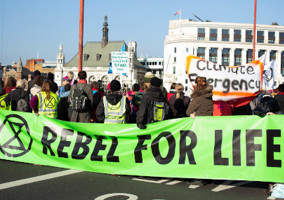The Charity Commission has been urged to remove charitable status from the Global Warming Policy Foundation (GWPF) after it was reported that the charity had received funding from fossil fuel interests.
In a letter sent yesterday, Extinction Rebellion and other signatories including academics, scientists and campaign groups said that GWPF, which focuses on climate and energy policy, is “not a charity but a fossil fuel lobby group”.
They also accused GWPF of failing to comply with the Charities Act 2011 and breaching the Commission’s rule that charities must operate “for the public benefit”.
Earlier this month, The Guardian and OpenDemocracy reported that GWPF had taken money from groups with oil and gas interests. Among the accusations, GWPF allegedly received $210,525 in 2018 and 2020 from the Sarah Scaife Foundation, which is believed to have $30m worth of shares in 22 energy companies including Exxon and Chevron.
GWPF called the claims “false and unfounded”.
Not a ‘charity’
The letter said that the revelations of GWPF’s financial support from oil and gas interests “render its charity status as void”.
It said: “We contend that GWPF is not a charity but a fossil fuel lobby group. Not only does the foundation continue to ignore the parameters set by the Charities Act 2011, but it also compounds previous infractions with more recent actions, which flout the Charity Commission’s requirement that charities must run ‘for the public benefit’.
“In promoting views that are not precautionary, and work against the public need to prepare, mitigate and adapt to the unfolding climate emergency, GWPF neither serves nor benefits society. Recent revelations of their secret funding sources make them nothing more than a fossil fuel lobby hiding behind charitable status.”
A history of complaints
GWPF was established in 2009 by Lord Nigel Lawson, a former Tory chancellor. Over the years, the charity has been the subject of multiple complaints, having been accused of spreading misinformation about global warming.
In 2014, GWPF was forced to launch a campaigning arm after it was formally accused of being primarily political, rather than educational, and of “continually disseminating inaccurate and misleading information”.
Last year, the Commission received a letter signed by 74 leading scientists who said that GWPF’s work was “detrimental to the general public from both an educational and health perspective” and called for the removal of its charitable status.
In yesterday’s letter, the signatories argued that “education does not appear to be the focus of the organisation” and that should its work be more successful in this area it would become “dangerous”.
It said: “Our further complaints are that GWPF attempts to influence the young with false claims about the science of global warming; promotes animosity towards those supporting the climate cause; promotes the views of marginal and outlier ‘academics’ whose views are easily refutable by mainstream science, and that this approach is not compatible with a charity’s duty to act in the public interest.”
An ‘obscene joke’
Jessica Townsend from Extinction Rebellion said: “A charity by definition is for the public benefit. It’s a kind of obscene joke that a fossil fuel lobby group, obstructing government policies on the climate emergency, can masquerade as a charity.”
Under section 34(1) of the Charities Act 2011, the Charity Commission must remove from the register any institution which it no longer considers is a charity and any charity which has ceased to exist or does not operate. However, in reality the Commission will generally attempt to apply its wide range of powers to help a charity to get back on track and fulfil a charitable mission, rather than simply dismissing an organisation from the register.
Mark Abbott, senior associate at Bates Wells, said: “Two basic legal rules are engaged here. First, a charity cannot exist for political purposes – and it is not ‘education’ in a charity law sense to seek to persuade people to take a particular point of view. Second, a charity needs to operate for the benefit of the public, rather than private actors. If a charity is seen to be promoting the interests of the fossil fuel industry, it could fall foul of both principles, which would warrant regulatory investigation.
“It would be unusual for the Charity Commission to take away charitable status from a registered charity, but it isn’t unprecedented – for example, the Commission did this with a number of gun clubs in the mid-1990s.”
Chris Willis Pickup, charities and social ventures partner at Taylor Vinters, said: “If the Commission deemed GWPF not to be operating for the public benefit, the most likely response is engagement with the trustees to bring GWPF’s activities into line with charity law and regulation. The regulator has the power to remove charities from its register but it’s rare to do this because of compliance issues, and there are legal limits on who can apply to the Commission to get a charity deregistered.”
Shivaji Shiva, charities partner at VWV, said: “The chair of the Commission, Orlando Fraser, has spoken about the need for the Commission to be fair, balanced and independent. In his inaugural speech he highlighted the importance of striking the right balance between being robust and being benign.
“Many across the sector will be watching with interest to see how the Commission reflects those values in responding to the concerns raised about GWPF.”
A Charity Commission spokesperson said: “We have received the letter and will assess all of the information shared with us to inform any next steps.”
Related articles












